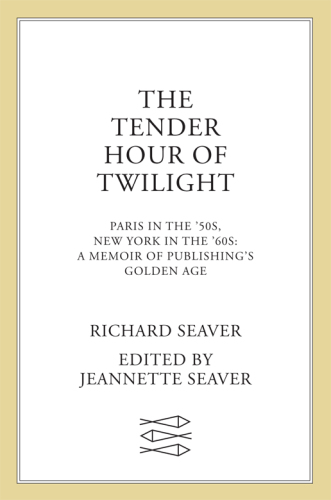
The Tender Hour of Twilight
Paris in the '50s, New York in the '60s: a Memoir of Publishing's Golden Age
- اطلاعات
- نقد و بررسی
- دیدگاه کاربران
نقد و بررسی

October 3, 2011
Like many American writers in the 1950s, Seaver went to Paris in search of the golden age of adventurous expatriate writers like Hemingway. Soon after his arrival, however, Seaver created his own golden age with his eloquent essays that introduced Samuel Beckett to the world and his adventurous exploits in publishing with the literary journal Merlin, whose fame he helped establish with the writings of Beckett, Sartre, and Ionesco. In this charming memoir, edited by his wife, Jeanette, Seaver cleverly chronicles his decade in Paris, where he met his wife, dipped his toes into book publishing, and introduced not only Beckett and Ionesco but also Jean Genet and numerous others to the world. After a stint in the Navy, Seaver moved to New York and entered publishing, first as a book club editor and scout and then most famously as the editor-in-chief of Grove Press. Grove’s founder, Barney Rosset, had noticed Seaver’s work on Merlin and had begun courting him even before Seaver left Paris. Together, they built a remarkable list that included the unexpurgated edition of Lady Chatterley’s Lover, Marguerite Duras, Kenneth Koch, William Burroughs, Alain Robbe-Grillet, and even Eric Berne’s best-selling Games People Play. In those heady days of publishing, as Seaver nicely and insightfully details, he and Rosset signed up books if the manuscript was good, the author serious, and the premise was provocative and controversial.

October 15, 2011
A dense, detailed, priceless eyewitness account of the making of a literary generation between Paris and New York. A native of Pennsylvania, a Navy man, erstwhile teacher and AFS fellow living in Paris in the early 1950s on a shoestring, Seaver fell in with a group of ex-pat writers and intellectuals turning out the English-language literary magazine Merlin, published by Alex Trocchi and Patrick Bowles. Seaver, who spoke French fluently and was in the process of completing graduate studies on James Joyce, had become acquainted with the writing of Samuel Beckett, also living in Paris but then fairly unknown although he had been publishing since the late '20s. Seaver's essay about Beckett and subsequent translations of his short work in the magazine helped spread the word about the brilliant but reclusive bilingual author, whom Seaver finally befriended and depicts here in wonderfully explicit passages. Other legendary figures Seaver encountered included the towering Jean-Paul Sartre, who graciously offered pieces from his own Les Temps modernes and urged him to publish Jean Genet. Gradually the magazine ventured into publishing books, inviting Olympia Press publisher Maurice Girodias to act as manager debuting with Beckett's Watt. Marriage to young French violinist Jeanette--later his co-editor at Arcade Publishing and the editor of this posthumously published work--and two subsequent years in the Navy Reserves prompted Seaver to relocate to New York, where he segued naturally into the managing editor role at Grove Press, run by Barney Rosset, the English publisher of Beckett and many of the same incendiary authors Seaver had championed in France. Indeed, the press would make its name fighting pornography charges in the '60s against D.H. Lawrence's Lady Chatterley's Lover, Henry Miller's Tropic of Cancer (and Capricorn) and William Burroughs' Naked Lunch, and valiantly standing by Last Exit to Brooklyn and The Autobiography of Malcolm X, among many others. A rich record of the vicissitudes of publishing during an inimitable time and place.
(COPYRIGHT (2011) KIRKUS REVIEWS/NIELSEN BUSINESS MEDIA, INC. ALL RIGHTS RESERVED.)

December 1, 2011
The late Seaver was a book editor whose career, intersecting with authors like Samuel Beckett, Eug'ne Ionesco, and Henry Miller, followed a colorful, impressionistic pattern, according to his memoir. Its episodes place Seaver first in bohemian Parisian literary circles, which Seaver inhabited from the late 1940s to 1954. Fondly bemused by his years abroad, Seaver recounts them with entertaining panache as he and his companions start a periodical, kite its financing, and tempt the interest of Sartre or Orson Welles. This idyll is interrupted by a U.S. Navy summons to active duty, but once discharged, Seaver resumed working in publishing for Barney Rosset's Grove Press, which routinely invited controversy in the 1960s with titles (like Miller's Tropic of Cancer) denounced as obscene. Breezy, insouciant vignettes of his high-strung boss, eccentric or drug-plagued authors, and adventures with William Burroughs at the Democratic Party's 1968 Convention reflect Seaver's revelry in his vocation, which ends with his departure from Grove in the early 1970s. A wry remembrance for readers interested in the industry, it recalls publishing's precorporate past, when contracts were signed with handshakes over drinks.(Reprinted with permission of Booklist, copyright 2011, American Library Association.)




دیدگاه کاربران